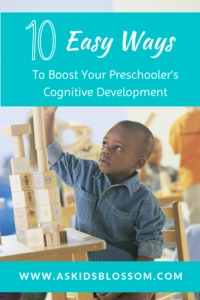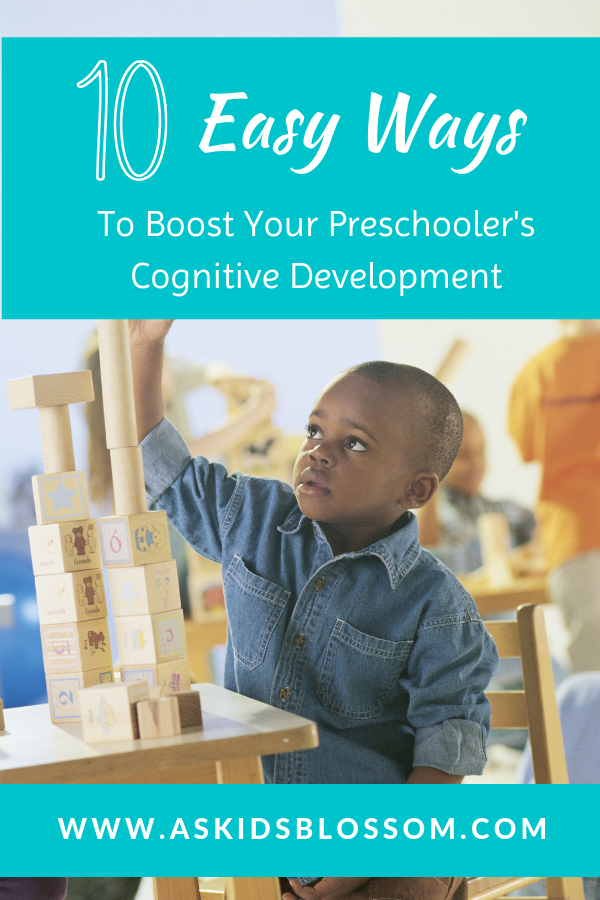
*This post contains affiliate links, meaning that, at no additional cost to you, I will earn a small commission if you click through and make a purchase.
If you’ve spent much time in the company of a preschooler, you know that they can have pretty wild imaginations, and often can come up with some amazing make-believe games. You may also have noticed that they are capable of more complex things than you would think for a person so small! That’s because, during the preschool years, big things are happening in terms of your preschooler’s cognitive development.
What is cognitive development?
Cognitive development is essentially how your child’s thinking and learning skills develop. Things like memory, problem-solving, and decision making are all parts of cognitive development.
What are some cognitive skills that are developing at the preschool age?
During the preschool years (ages 3-5), you should observe your child’s cognitive development and notice certain milestones. Some things that you should see your child doing include:
- Playing make believe
- Doing puzzles with an increasing number of pieces (starting with 3-4)
- Copying a shape that you have drawn, starting with a circle and moving onto other geometric shapes
- Turning pages of a book, eventually being able to recall certain parts of a story
- Understanding the idea of counting, eventually being able to count up to 10 items
- Drawing a person, increasing from 2-4 body parts up to 6 (or more!)
- Printing some letters and numbers
- Demonstrating knowledge about everything, like food and money
10 Easy Ways to Boost Your PreSchooler’s Cognitive Development
Remember, your preschooler’s cognitive development, like all areas of development, is a unique process and different for every child! The above lists milestones in this area of development, but these milestones will happen at different times for every child. At the end of the post I will share some red flags, but for now, let’s focus on some easy ways that you can boost your preschooler’s cognitive development!
Read high-quality children’s books
It’s a good idea to focus on books that include things like reasoning and problem solving, symbolic play, metacognitive knowledge, memory, and social cognition since these are aspects of cognition that are developing during this time. Some great books to add to your library that support cognitive development include: The Very Hungry Caterpillar, How a House is Built, Have Fun, Molly Lou Melon, and Alexander and the Terrible Horrible No Good Very Bad Day. It’s also important to talk to your children before, during, and after reading to them. Ask them to make predictions and share what they remember, and encourage activities that are related to books that you have read.
Listen to music and do sing-alongs
Music has long been linked to increased cognitive function. Teach your child simple songs in early childhood (think “Row Row Row Your Boat” or “Mary Had a Little Lamb”) and enjoy singing them together! It’s also fun to introduce your child to music that you love- you don’t have to only listen to children’s albums! There are also a number of great children’s music classes to check out, depending on your area.
Incorporate numbers and counting into your daily life
Long before your child is counting independently, they begin to understand the concept. It’s easy to incorporate counting into your day, and this early exposure really helps set the stage for learning these skills. You can count in the grocery store, as you clean up toys when you are serving snack…the possibilities are endless!
Asking questions
Preschoolers ask a lot of questions of adults, but it’s important to ask them questions, too! Ask them about the books that you have read, things that they see out in the world, and ideas that they have about things! My favorite way to ask questions is this: when your child poses a question to you, for example, “How did this puddle get here?”, turn it around on them- “Well what do you think?” This helps get them thinking and also teaches them that their ideas are valuable. (A lot of times their ideas are pretty crazy, so I usually just answer with “Wow! What an interesting idea!”)
Going on adventures to interesting places
Almost anything is interesting when you have a preschooler. I’m always amazed to see how fascinating they can find the simplest of things. However, it’s great to make it a point to take them out to places where they will see things that are outside of their daily lives. Try planning a trip to a local museum, or visiting a nature center.
Facilitating imaginary or symbolic play
I know that sometimes grown-ups can struggle with playing pretend, but even just setting something up for your child is good enough! Providing dress-up clothes, toy kitchen supplies, or a variety of figures (people or animals) can be a perfect set up for your little one. You don’t even need to buy anything special- one of my favorite things to do is set up a play grocery store using canned and boxed items from my kitchen! The kids love pricing each item and setting up a conveyor belt and play cash register.
Memory games
There are a number of games on the market that help with memory skills. A current favorite in our house is this PJ Masks Memory game. Also Guess Who? Is a great one!
Doing art projects
Many parents have a love/hate relationship with art projects! They are great for creativity, but sometimes the mess can be overwhelming. Not to mention the cost of supplies. But, doing art doesn’t have to be messy or expensive. Keep it simple with construction paper and glue, or try using recyclable items to make art. Often just setting out a bunch of open-ended supplies and letting your child be creative is the best way to “do art.”
Do puzzles
Puzzles are great for cognitive development! There are so many options out there, but I personally love Melissa and Doug puzzles. They are of high quality and really last!
Building or constructing games
Most kids love to build, and will do so with whatever materials are available! I definitely suggest Duplos for the younger kids, and it’s great to buy colored blocks if you want to use them for sorting activities as well. Magna-Tiles are a bit on the expensive side, but they are really cool to build with. Set a few options out and challenge your child to build you the highest tower that they can, or build something with a certain number of blocks.
Red Flags
As I mentioned above, children all develop differently, so it’s important not to get stuck in the comparing game. However, there are a few red flags to look out for in terms of cognitive development.
You may have cause for concern if:
-By 3 years old your child can’t do a simple puzzle, follow basic instructions, or doesn’t play pretend or make-believe.
-At 4 years old your child has trouble scribbling, doesn’t understand same/different, doesn’t show an interest in make-believe games, or can’t follow 3-4 part commands.
-By 5 years old your child doesn’t draw pictures, doesn’t respond to people (or responds superficially), doesn’t show an interest in playing a variety of games and activities, or can’t tell the difference between real and make believe.
A great resource on this topic is The Centers for Disease Control and Prevention. They have a milestone tracker app that can be quite useful in tracking your child’s development from birth through age 5. As always, if you have concerns about your child’s development and would like to set up a free consultation to discuss your concerns, please reach out! I would love to help you determine your child’s individual needs. We are here to support you as you help your child blossom!
Please join us in our FREE Facebook community to share if you have done any of these activities! We would love to hear from you.
If you liked reading 10 Easy Ways to Boost Your Preschooler’s Cognitive Development, you might also like:
Three Games for Helping Children Follow Directions
Preschool Routines: Set Your Child Up For Success
